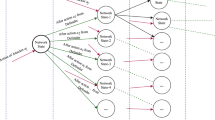Abstract
Cyber-physical systems are facing new security challenges from Advanced Persistent Threats (APTs) due to the stealthy, dynamic and adaptive nature of the attack. The multi-stage Bayesian game captures the incomplete information of the players’ type, and enables an adaptive belief update according to the observable history of the other player’s actions. The solution concept of perfect Bayesian Nash equilibrium (PBNE) under the proactive and reactive information structures of the players provides an important analytical tool to predict and design the players’ behavior. To capture the learning process and enable fast computation of PBNE, we use conjugate priors to update the beliefs of the players parametrically, which is assimilated into backward dynamic programming with an expanded state space. We use a mathematical programming approach to compute the PBNE of the dynamic bi-matrix game of incomplete information. In the case study, we analyze and study two PBNEs under complete and one-sided incomplete information. The results reveal the benefit of deception of the private attackers’ types and motivate defender’s use of deception techniques to tilt the information asymmetry. Numerical results have been used to corroborate the analytical findings of our framework and show the effectiveness of defense design to deter the attackers and mitigate the APTs strategically.
Access this chapter
Tax calculation will be finalised at checkout
Purchases are for personal use only
Similar content being viewed by others
Notes
- 1.
Note that \(q^*(\theta _2)=\frac{R_{11}^1(\theta _2)-R_{21}^1(\theta _2)}{R_{22}^1(\theta _2)-R_{12}^1(\theta _2)-R_{21}^1(\theta _2)+R_{11}^1(\theta _2)}, p^*\in [0,1]\) is a equilibrium pair under a restrictive condition \( R_{22}^1(\theta _2)-R_{12}^1(\theta _2)-R_{21}^1(\theta _2)+R_{11}^1(\theta _2)=0, R_{21}^1(\theta _2)=R_{11}^1(\theta _2), \forall \theta _2\).
References
Basar, T., Olsder, G.J.: Dynamic Noncooperative Game Theory, vol. 23. Siam, Philadelphia (1999)
Bathelt, A., Ricker, N.L., Jelali, M.: Revision of the tennessee eastman process model. IFAC-PapersOnLine 48(8), 309–314 (2015)
Cárdenas, A.A., Baras, J.S., Seamon, K.: A framework for the evaluation of intrusion detection systems. In: 2006 IEEE Symposium on Security and Privacy, pp. 15-pp. IEEE (2006)
Cole, E.: Advanced Persistent Threat: Understanding the Danger and How to Protect Your Organization. Newnes, Oxford (2012)
Harsanyi, J.C.: Games with incomplete information played by “Bayesian” players, i-iii part i. the basic model. Manage. Sci. 14(3), 159–182 (1967)
Horák, K., Zhu, Q., Bošanskỳ, B.: Manipulating adversary’s belief: a dynamic game approach to deception by design for proactive network security. In: Rass, S., An, B., Kiekintveld, C., Fang, F., Schauer, S. (eds.) Decision and Game Theory for Security. LNCS, vol. 10575, pp. 273–294. Springer, Cham (2017). https://doi.org/10.1007/978-3-319-68711-7_15
Huang, L., Chen, J., Zhu, Q.: A large-scale markov game approach to dynamic protection of interdependent infrastructure networks. In: Rass, S., An, B., Kiekintveld, C., Fang, F., Schauer, S. (eds.) GameSec 2017. LNCS, vol. 10575, pp. 357–376. Springer, Cham (2017). https://doi.org/10.1007/978-3-319-68711-7_19
Huang, L., Zhu, Q.: Adaptive strategic cyber defense for advanced persistent threats in critical infrastructure networks. In: ACM SIGMETRICS Performance Evaluation Review (2018)
Liu, Y., Ning, P., Reiter, M.K.: False data injection attacks against state estimation in electric power grids. ACM Trans. Inf. Syst. Secur. (TISSEC) 14(1), 13 (2011)
Manshaei, M.H., Zhu, Q., Alpcan, T., Başar, T., Hubaux, J.P.: Game theory meets network security and privacy. ACM Comput. Surv. (CSUR) 45(3), 25 (2013)
Pawlick, J., Colbert, E., Zhu, Q.: A game-theoretic taxonomy and survey of defensive deception for cybersecurity and privacy. arXiv preprint arXiv:1712.05441 (2017)
Stech, F.J., Heckman, K.E., Strom, B.E.: Integrating cyber-D&D into adversary modeling for active cyber defense. In: Jajodia, S., Subrahmanian, V., Swarup, V., Wang, C. (eds.) Cyber Deception, pp. 1–22. Springer, Cham (2016). https://doi.org/10.1007/978-3-319-32699-3_1
Van Dijk, M., Juels, A., Oprea, A., Rivest, R.L.: FlipIt: the game of “stealthy takeover”. J. Cryptol. 26(4), 655–713 (2013)
Zhang, T., Zhu, Q.: Strategic defense against deceptive civilian GPS spoofing of unmanned aerial vehicles. In: Rass, S., An, B., Kiekintveld, C., Fang, F., Schauer, S. (eds.) International Conference on Decision and Game Theory for Security. LNCS, vol. 10575, pp. 213–233. Springer, Cham (2017). https://doi.org/10.1007/978-3-319-68711-7_12
Zhu, Q., Basar, T.: Game-theoretic methods for robustness, security, and resilience of cyberphysical control systems: games-in-games principle for optimal cross-layer resilient control systems. IEEE Control Syst. 35(1), 46–65 (2015)
Author information
Authors and Affiliations
Corresponding authors
Editor information
Editors and Affiliations
Rights and permissions
Copyright information
© 2018 Springer Nature Switzerland AG
About this paper
Cite this paper
Huang, L., Zhu, Q. (2018). Analysis and Computation of Adaptive Defense Strategies Against Advanced Persistent Threats for Cyber-Physical Systems. In: Bushnell, L., Poovendran, R., Başar, T. (eds) Decision and Game Theory for Security. GameSec 2018. Lecture Notes in Computer Science(), vol 11199. Springer, Cham. https://doi.org/10.1007/978-3-030-01554-1_12
Download citation
DOI: https://doi.org/10.1007/978-3-030-01554-1_12
Published:
Publisher Name: Springer, Cham
Print ISBN: 978-3-030-01553-4
Online ISBN: 978-3-030-01554-1
eBook Packages: Computer ScienceComputer Science (R0)




